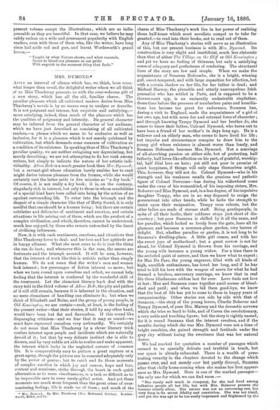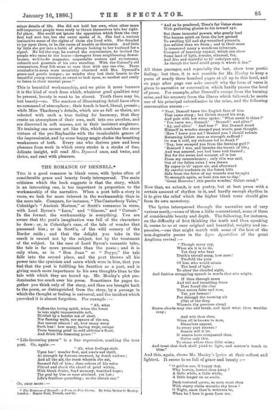MRS. DYMOND.*
AFTER an interval of silence which has, we think, been some- what longer than usual, the delightful writer whom we all think of as Miss Thackeray presents us with the ever-welcome gift of a new story, which has all the old, familiar charm. The peculiar pleasure which all cultivated readers derive from Miss Thackeray's novels is by no means easy to analyse or describe. It is not poignant and intense, but exquisite and satisfying,— more satisfying, indeed, than mach of the pleasure which has the qualities of poignancy and intensity. Its general character may be inferred from the general character of her audience, which we have just described as consisting of all cultivated readers,—a phrase which we mean to be exclusive as well as inclusive, for it is a pleasure which is not merely quickened by cultivation, but which demands some measure of cultivation as a condition of its existence. In speaking thus of Miss Thackeray's peculiar quality, we are neither eulogising nor depreciating, but merely describing; we are not attempting to fix her rank among writers, but simply to indicate the nature of her artistic indi- viduality. Adam Bede is a much greater book than Mrs. Dymond; but a servant-girl whose education barely enables her to read might derive intense pleasure from the former, while she would certainly cast the latter aside in five minutes as "a dry book." Of course, it is not really a dry book ; it is, on the contrary, singularly rich in interest, but only to those in whom sensibilities of a special kind have been called into being by the action of an opulent surrounding life. To enter into the triumph and the despair of a simple character like that of Hetty Sorrel, it is only needful that one should be a human being ; but there are certain subtleties and delicacies of sentiment and emotion, and certain situations in life arising out of them, which are the product of a complex civilisation, and which, therefore, cannot be understood, much less enjoyed, by those who remain untouched by the finest of civilising influences.
Now, it is with such sentiments, emotions, and situations that Miss Thackeray loves to deal; and her love and her aptitude are in happy alliance. What she most cares to do is just the thing she can do best ; and whenever this is the case, the omens are fortunate and the triumph assured. It will be seen, however, that the interest of work like this is artistic rather than simply human. We do not mean that the writer's men and women lack interest ; few personages of fiction interest us more ; but when we turn round upon ourselves and reflect, we cannot help feeling that the interest is conferred by the wonderful skill of the treatment. Let the clumsiest literary hack deal with the story told in the third volume of Adam Bede, the pity and pathos of it will still remain, because it is inherent in the situation, and no mere clumsiness of handling can eliminate it ; but when we think of Elizabeth and Reine, and the group of young people, in 014 Ken,sington, we are certain—such, at least, is the feeling of the present writer—that their stories, if told by any other hand, would have been but flat and flavourless. If this sound like disparaging criticism—and we fear that it may so sound—we must have expressed ourselves very awkwardly. We certainly do not mean that Miss Thackeray by a clever literary trick confers interest upon people and incidents which are naturally devoid of it ; but that by very delicate instinct she is able to discern, and by very subtle art able to realise and make apparent, the interest which lurks in the neglected corners of common life. It is comparatively easy to picture a great rapture or a great agony, though the picture can be executed adequately only by the power of genius ; but to catch and fix those moments of complex emotion in which joy and sorrow, hope and fear, content and weariness, strike through the heart in such quick alternation as to seem simultaneous, is a task so difficult as to be impossible save to some rarely-gifted artist. And yet these moments are much more frequent than the great crises of over- mastering feeling; life is made up of them ; and much of the
• Mrs. Dymond. By Miss Thackeray (Mrs. Richmond Ritchie). London: Smith, Bider, ard Co.
charm of Miss Thackeray's work lies in her power of realising those half-tones which most novelists compel us to take for granted,—to read into their books, not to read out of them.
Any of Miss Thackeray's stories will serve as an illustration of this, but our present business is with Mrs. Dymond. Its construction is very slight and inartificial, much less elaborate than that of either The Village on the Oliff or Old Kensington ; and yet we have no feeling of thinness, but only a satisfying sense of adequacy and perfectness of rendering. The structural lines of the story are few and simple. When we make the acquaintance of Susanna Holcombe, she is a bright, winning girl, sweet-tempered, and with large capacities for affection, but with a certain shadow on her life, for her father is dead; and Michael Marney, the plausible and utterly unscrupulous Irish journalist who has settled in Paris, and is supposed to be a Government spy, is an eminently undesirable stepfather.
Some time before the pressure of numberless pains and humilia- tions has become too great for endurance, Susanna has, during a visit to England, made the acquaintance of a girl of her own age, but with more fire and external force of character ;
and through knowing Tempy Dymond and her brother Jo, she comes to know their father, Colonel Dymond, who turns out to have been a friend of her mother's in days long ago. He is a widower and an elderly man, who seems to have lived his life; but impulse and circumstance conspire to draw him to the young girl whose existence is almost worse than lonely, and
Susanna Holcombe becomes Mrs. Dymond. Not a marriage of all-absorbing passion on either side, but of protecting, half fatherly, half lover-like affection on his part, of grateful, worship- ful, half filial love on hers ; yet still not poor in promise of quiet happiness, if things will only shape themselves aright. This, however, they will not do. Colonel Dymond—who in his strength and his weakness recalls the gracious and pathetic figure of Colonel Newcome—has during his widowhood come under the sway of his womankind, of his imposing sisters, Mrs.
Bolsover and Miss Dymond, and, in a less degree, of his impulsive daughter Tempy, who are in no way disposed to resign the government into other hands, while he lacks the strength to insist upon their resignation. Tempy soon relents, but the
older ladies are made of sterner stuff. Being gentlepeople, in
spite of all their faults, their coldness stops just short of dis- courtesy; but poor Susanna is chilled by it all the same, and her paradise, which looked so lovely from the gate, loses all its glamour, and becomes a common-place garden, very barren of delight. But, whether paradise or garden, it is not long to be
Susanna's dwelling-place. A little girl comes, and with her the sweet joys of motherhood ; but a great sorrow is not far
ahead, for Colonel Dymond is thrown from his carriage, and the young wife becomes a young widow. For a time there is the secluded quiet of sorrow, and then we know what to expect ; for Max Du Parc, the young engraver, filled with all kinds of high, unselfish enthusiasms, has loved her long, and if he has tried to kill his love with the weapon of scorn for what he had deemed a loveless, mercenary marriage, we know that in real life these blindnesses seldom last for ever. Love finds out love at last ; Max and Susanna come together amid scenes of blood- shed and peril; and when we bid them good-bye, we know that the best of life has yet to come to them in happy years of companionship. Other stories run side by side with that of Susanna,—the story of the young lovers, Charlie Bolsover and Tempy Dymond, of poor Mrs. Marney and the domestic sorrows which she tries so hard to hide, and of Caron the revolutionary, a very noble and touching figure; but the story is rightly named, for it is round Susanna that the interest revolves, and if the months during which she was Mrs. Dymond were not a time of
bright sunshine, she gained strength and fortitude under the grey sky without losing the sweetness that was her natural
dower.
We had marked for quotation a number of passages which
seemed to us specially delicate and truthful in touch, but our space is already exhausted. There is a wealth of pene- trating veracity in the chapters devoted to the change which passes over, and not merely over but partly through, Susanna after that chilly home-coming when she makes her first appear-
ance as Mrs. Dymond. Here is one of the marked passages— the only one for which we can find room :—
"She rarely said much in company, for she had lived among talkative people all her life, but with Mrs. Bolsover present she became utterly silent. Her nature was not an outcoming one, but very deep in its secret fidelity and conviction. She was not timid, and yet she was apt to be too easily impressed and frightened by the minor details of life. She did not hold her own, when other more self-important people were ready to thrust themselves into her right- fal place. She could not ignore the opposition which from the very first had met her, but she never spoke of it. She had a curious instinctive sense of the rights of those she lived with. She dreaded to jar upon them, to be the cause of trouble or discussion. And little by little she got into a habit of always looking to her husband for a signal. He led the way, he started the conversation, he invited the people who came to the house—dowagers from neighbouring dower. houses, well-to-do magnates, respectable rectors and rectoresses, colonels and generals of his own standing. With the Colonel's old companions, Susy felt more at ease than with any one else. These comrades-in-arms were invariably charmed with Mrs. Dymond's grace and gentle temper; no wonder they lost their hearts to the beautiful young creature, so sweet to look upon, so modest and ready to listen to their martial prose."
This is beautiful workmanship, and we prize it more because it is the kind of work from which, whatever good qualities may be present, beauty is wont to be absent. Truth there may be, but beauty—no. The masters of illuminating detail have often no command of atmosphere ; their touch is hard, literal, prosaic ; while Miss Thackeray's details, which are as full as theirs, are selected with such a true feeling for harmony, that they create an atmosphere of their own, melt into one another, and are discerned in soft masses, not in their insistent singleness. No training can secure art like this, which combines the stern virtues of the pre-Raphaelite with the incalculable graces of the impressionist, and by some happy magic eludes the besetting weaknesses of both. Every one who derives pure and keen pleasure from work in which every stroke is a stroke of fine, delicate insight, will read Mrs. Dymond once, and twice, and thrice, and read with pleasure.



































 Previous page
Previous page